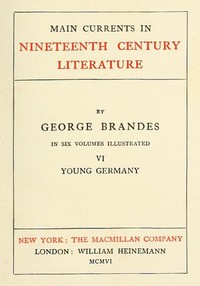Main Currents in Nineteenth Century Literature - 6. Young Germany by Georg Brandes
"Main Currents in Nineteenth Century Literature - 6. Young Germany" by Georg Brandes is a historical and literary analysis written in the early 20th century. This volume examines the literary movement known as Young Germany and its context within the socio-political landscape of the 19th century, focusing particularly on the reactionary political climate following the Napoleonic Wars and the influence of revolutionary movements. The work reflects on key literary figures and the
role of literature as a vehicle for political and societal critique during a time of unrest and emerging nationalism in Germany. The opening of the book situates the Young Germany movement against the backdrop of significant political repression following the Napoleonic Wars, particularly under figures like Metternich, who sought to quell revolutionary sentiment. Brandes describes the disappointment among the German youth who had hoped for unification and freedom but faced a harsh reality of reactionary politics. Notable individuals such as Ludwig Börne and Heinrich Heine emerge as voices of resistance against this oppression, employing their literary works to advocate for freedom and national identity. The early chapters emphasize the bleak state of German society and the yearning for political liberty, setting the stage for a deeper exploration of how literature intersected with the cultural and political currents of the time. (This is an automatically generated summary.)
Read or download for free
| How to read | Url | Size | |||
|---|---|---|---|---|---|
| Read now! | https://www.gutenberg.org/ebooks/48042.html.images | 986 kB | |||
| EPUB3 (E-readers incl. Send-to-Kindle) | https://www.gutenberg.org/ebooks/48042.epub3.images | 1.1 MB | |||
| EPUB (older E-readers) | https://www.gutenberg.org/ebooks/48042.epub.images | 1.1 MB | |||
| EPUB (no images, older E-readers) | https://www.gutenberg.org/ebooks/48042.epub.noimages | 444 kB | |||
| Kindle | https://www.gutenberg.org/ebooks/48042.kf8.images | 1.4 MB | |||
| older Kindles | https://www.gutenberg.org/ebooks/48042.kindle.images | 1.4 MB | |||
| Plain Text UTF-8 | https://www.gutenberg.org/ebooks/48042.txt.utf-8 | 864 kB | |||
| Download HTML (zip) | https://www.gutenberg.org/cache/epub/48042/pg48042-h.zip | 1.0 MB | |||
| There may be more files related to this item. | |||||
Similar Books
About this eBook
| Author | Brandes, Georg, 1842-1927 |
|---|---|
| Translator | Morison, Mary |
| Translator | White, Diana |
| Title | Main Currents in Nineteenth Century Literature - 6. Young Germany |
| Alternate Title | Main Currents in 19th Century Literature - 6. Young Germany |
| Note | Reading ease score: 54.9 (10th to 12th grade). Somewhat difficult to read. |
| Contents | The political background -- Philosophy and reaction -- Spirit of the opposition -- Influence of the Revolution of July -- Influence of Byron -- Value of the new literature -- Börne -- Heine -- Heine and goethe -- Heine -- Literature and party -- Immermann -- Hegelianism -- Young Germany and Menzel -- Gutzkow, Laube, Mundt -- Rahel, Bettina, Charlotte Stieglitz -- Frederick William IV. of Prussia -- The neutral literature -- Political poetry, philosophical revolution -- Revolutionary poetry -- Revolutionary poetry -- The revolution -- Conclusion. |
| Credits | Produced by Jens Guld and Marc D'Hooghe (Images generously made available by the Internet Archive.) |
| Language | English |
| LoC Class | PN: Language and Literatures: Literature: General, Criticism, Collections |
| Subject | Literature, Modern -- 19th century -- History and criticism |
| Subject | Naturalism in literature |
| Subject | Romanticism |
| Category | Text |
| EBook-No. | 48042 |
| Release Date | Jan 22, 2015 |
| Most Recently Updated | Apr 4, 2024 |
| Copyright Status | Public domain in the USA. |
| Downloads | 184 downloads in the last 30 days. |
| Project Gutenberg eBooks are always free! | |


